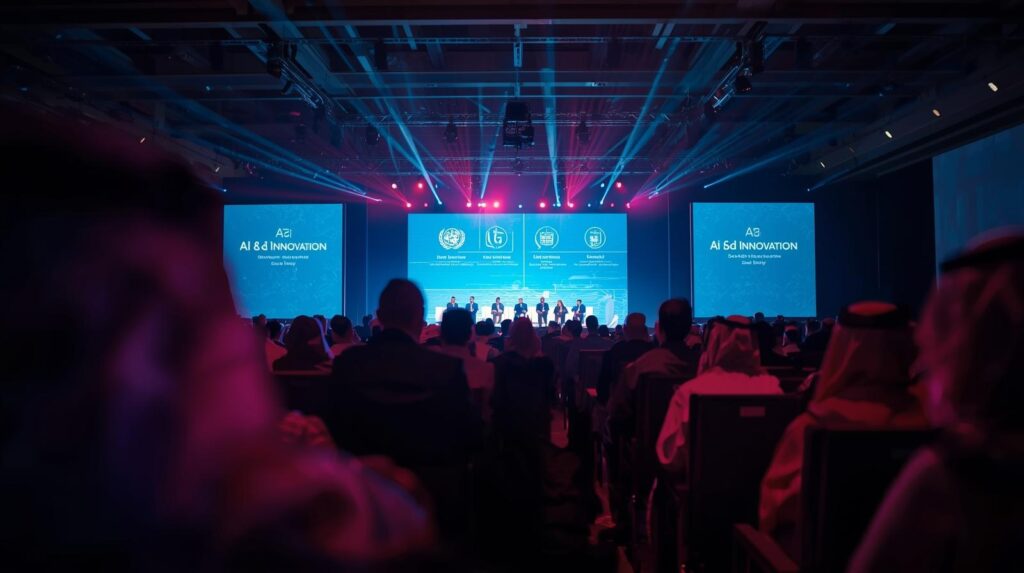Riyadh, Saudi Arabia – November 10, 2025 — The United Nations World Tourism Organization (UN Tourism) convened an extraordinary Thematic Session at the 26th UN Tourism General Assembly in Riyadh, under the theme “The Impact of Artificial Intelligence and Innovation in Shaping Global Tourism.”
Hosted in the Prince Sultan Grand Hall at the Mandarin Oriental, this session brought together ministers, industry leaders, and global innovators to explore how AI and cutting-edge technologies are transforming the travel sector into a more intelligent, inclusive, and sustainable ecosystem.
Opening Remarks: A Vision for the Future of Tourism
The event commenced with Natalia Bayona, Executive Director of UN Tourism, as Master of Ceremony, setting the stage for a transformative dialogue on the role of technology in the future of tourism.
H.E. Zurab Pololikashvili, Secretary-General of UN Tourism, and H.E. Ahmed Al-Khateeb, Minister of Tourism of the Kingdom of Saudi Arabia, delivered the opening remarks. Both emphasized the importance of collaboration, innovation, and ethical AI deployment in driving the next evolution of the global tourism economy.

“Tourism stands at the forefront of innovation,” said H.E. Pololikashvili. “Artificial intelligence is not a challenge—it’s an opportunity to enhance experiences, empower communities, and ensure sustainable growth.”
Keynote: “The Future of Tourism – Artificial Intelligence and Global Investment Trends”
In a forward-looking keynote, Ms. Natalia Bayona outlined how artificial intelligence is transforming every dimension of the travel ecosystem—from strategic planning and investment to customer engagement and workforce education.

She unveiled UN Tourism’s roadmap for AI-driven growth, highlighting initiatives in innovation hubs, capacity-building programs, and global investment partnerships that will accelerate digital transformation in tourism across all regions.
Honoring Innovation: The UN Tourism Artificial Intelligence Challenge
Following the keynote, the UN Tourism Artificial Intelligence Challenge Awards celebrated startups and organizations pioneering responsible AI solutions in tourism. Winners showcased how technology can optimize sustainability, elevate visitor experiences, and support local economies while preserving culture and the environment.
High-Level Policy Debate: The Transformation of Tourism through AI
The session’s highlight was a High-Level Policy Debate, moderated by Antonio López de Ávila, Head of Innovation, Education, and Investments at UN Tourism.

The debate featured contributions from 31 Heads of Delegation representing countries across five continents, along with key private-sector leaders who are driving digital transformation at scale:
- Maher Kouba, President, Amadeus EMEA
- Kimi Liu, Vice President, Trip.com Group
- Alejandro Mullor, Tourism Lead, Worldwide Public Sector, Microsoft
- Charlotte Boutboul, Lead, Urban Transformation, World Economic Forum
Special remarks were delivered by Mr. Apostolos Tzitzikostas, EU Commissioner for Sustainable Transport and Tourism, who highlighted the urgency of international cooperation to ensure AI systems are transparent, ethical, and inclusive.

“Innovation and ethics must walk hand in hand,” noted Mr. Tzitzikostas. “As we embrace the power of AI, we must ensure it strengthens communities, protects nature, and opens doors for all.”
Panelists explored how artificial intelligence can revolutionize destination management, optimize resources, and create new pathways for sustainable economic development while maintaining the human essence of travel.
Adoption of the Riyadh Declaration on AI and Global Tourism
The session concluded with the Consideration and Adoption of the Riyadh Declaration, read by H.E. Ahmed Al-Khateeb, Minister of Tourism of Saudi Arabia. The declaration formally recognizes artificial intelligence and innovation as cornerstones of global tourism’s evolution, reinforcing the sector’s commitment to technology-driven sustainability, education, and inclusive growth.
“Riyadh stands ready to lead the world into a new era of intelligent, sustainable tourism,” said Minister Al-Khateeb. “This declaration reflects our shared vision to build a smarter, greener, and more connected future for travel.”

A Defining Moment for Global Tourism
The Thematic Session in Riyadh not only symbolized 50 years of UN Tourism’s global leadership but also set the tone for the next 50 — an era in which AI, innovation, and collaboration will define success.
Through visionary leadership and cross-sector partnerships, the Kingdom of Saudi Arabia and UN Tourism are driving an unprecedented transformation — ensuring that the future of tourism is not only digital, but also sustainable, inclusive, and human-centered.
About UN Tourism
UN Tourism (formerly UNWTO) is the United Nations agency responsible for promoting responsible, sustainable, and universally accessible tourism. The organization leads global efforts to make tourism a driver of economic growth, inclusive development, and environmental stewardship.





